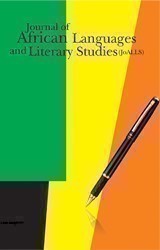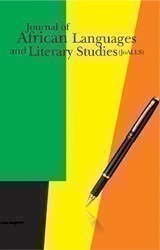
 editor@adonis-abbey.com
editor@adonis-abbey.com ![]() UK: 0207 795 8187 / Nigeria:+234 705 807 8841
UK: 0207 795 8187 / Nigeria:+234 705 807 8841
Adonis-Abbey's Journal Section

Journal of African Languages and Literary Studies (JoALLS)
Publication Frequency: Tri-annual (Three times a year) ISSN: 2633-2108 E-ISSN: 2633-2116
Journal of African Languages and Literary Studies (JoALLS) Volume 3, Number 2, August, 2022
I am delighted to present to you this August edition of JOALLS. In essence, it is a compilation of eight papers which explore unique issues that face humanity in different ways. Your duty as scholars is to further interrogate the ways in which authors have presented the issues they address in their papers. The stringent requirements that higher education institutions put for their academics to get promoted to senior, lecturer, associate professor and professor grades in some cases have resulted in what Ngeh terms ‘meal ticket scholarship’. Similarly, Nhemachena’s and Mawere’s recent thought-provoking paper addresses ‘academics with clay feet’. What I find striking is that, whether it is ‘meal ticket scholarship’ or ‘academics with clay feet’, both papers condemn mediocre scholarship which is mainly due to the ‘publish or perish’ mantra that obtains in academia. Moving from academia to politics, we find out that the questions of ‘cosmetic democracy, coups an............
Journal of African Languages and Literary Studies (JoALLS) Volume 2, Number 3, December, 2021
When the devastating COVID-19 pandemic struck the world, universities had to pragmatically deal with change and adaptation in order to survive. Up to now, our universities are still adapting to the change in every respect because of the pandemic which is still amongst us. We have witnessed remarkable ways in which students, staff and stakeholders have adapted to the complexities brought by the pandemic. It has been established that in organisations, there is a strong relationship between evolution, adaptation and survival. Keith Morrison in ‘School Leadership and Complexity Theory’ discussion (2002) suggests ‘Complexity to be a theory of change and adaptation detailing how change occurs in systems as well as the principles and mindsets needed to flourish in turbulent environments’ that has not changed since 2002. Morrison’s theory is applicable to the situations our higher education institutions are in, especially now during the troubled ............
Journal of African Languages and Literary Studies (JoALLS) Volume 2, Number 2, August 2021
In pursuit of happiness and fulfillment We argue in the present article that cumulatively over time, inexorable as it is, like change with the evolvement of time, perceptions and values remain immutable to the demands of the day in any society, wittingly or unwittingly. The hearty professor of Political Science from the University of Zimbabwe and former Cabinet Minister in the late former President R G Mugabe’s reign, Professor Jonathan Moyo once remarked: ‘Only a fool does not change his mind’. Does anyone who does change their minds/perspectives answer to the call of wisdom or they actually buttress the foolishness therein ingrained in their life’s outlook/worldview, generally? What is there to gain or lose by adjusting perceptions, positions, persuasions, and strategies to be an active agent in the pursuit of life in its fullness? Is it a crime to shift perceptions in whatever area of one’s life? Is joy always the outcome? ............
Journal of African Languages and Literary Studies (JoALLS) Volume 2, Number 1, April 2021. Editor Ruby Magosvongwe
Conversing the framing and structuring of African Languages and Literary Studies: A snippet The present volume gives selected insights into conversations about framing ‘mother/woman’ disruptions, agency and struggles for emancipation in both symbolic and literary terms. The framing we read herein could be microcosmic of broader voices shared on the continent and the Diaspora, notwithstanding the fact that there are as many contestations around narratives and concepts as there are interest groups and respective conceptual frameworks. Within the differently framed conversations that the present journal embeds, despite the rigour that each article exudes, commonalities do converge. Cumulatively and collectively, the articles excavate inferiorised epistemologies, which, when brought to the centre of conversations about the knowledge economies from Africa, shifts about monolithic conceptions about transcendence from positions of marginality would most............
Journal of African Languages and Literary Studies (JoALLS) Volume 1, Number 3, December 2020
The themes of colonisation and decolonisation dominate in this issue of JoALLS. The colonisation of African communities by European forces was so inhuman and brutal that it left skeletons of African people littered in affected areas on the continent. The trails of murder, massacre, plunder and displacement of defenceless and innocent Africans by marauding, bloodthirsty colonialists are unsavory, heart-rending and disgusting. The crucial role literature plays in documenting the trials and tribulations of Africans cannot be overemphasized. The historical novel and (auto) biography have always become handy in this regard, although caution should be taken on which perspective they are framed. As you read this issue, you will realise that the words ‘Germans’ and ‘genocide’ are what linguists call ‘collocates’; in other words, you cannot talk of one of these two words without the other as the Germans’ heinous crimes were meant to decimate the H............
To subscribe to any of the journals, Please Email Us.














